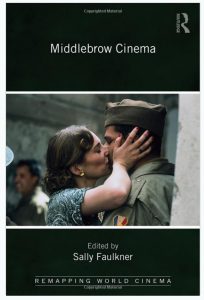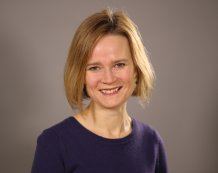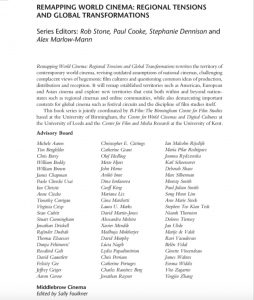While we played with the incoming abstracts for The Routledge Companion to World Cinema, our new book series from Routledge entitled Remapping World Cinemas: Regional Tensions and Global Transformations was also taking shape. You might think that editing a book series is much bigger than editing a single book, but the truth is that there are so many working parts to an edited volume that a million things can go wrong. With a book series you only have to make sure that the authors and editors recruited to contribute to the series are reliable, brilliant and tolerant of the fact that, at least in the initial stages, we were making this all up as we went along.
Luckily, alongside abstracts for The Routledge Companion to World Cinema we began receiving proposals for books in the series too. Some of these were as vague as an idea of post-Brexit Britain. Others were clearly intended to be ground-breaking and came complete with a whole load of preparatory research, literature reviews, chapter outlines and sample writing. E-mails flew like pinballs as we herded the best to external reviewers and then onto the decision-makers at Routledge. To be fair, Routledge trusted our judgement because we had already recruited an international advisory board for the series, which contained many of the contributors to The Routledge Companion to World Cinema. Synergetic? Us? Too right.
So we set in motion the first books in the series. Transworld Cinemas from David Martin-Jones, Remapping Brazilian Cinema from Stephanie Dennison, and Magic Realism: The Avant-Garde in Exile from Felicity Gee. This was fun! Like asking Santa for books that didn’t exist but you really wanted to read. There’ll be more on those and other forthcoming titles as they come close to publication; but the surprise was that the book series was also becoming a beacon for other books that might suit its remit.
Routledge got in touch. They had a book called Middlebrow Cinema edited by Sally Faulkner containing eleven chapters from experts (some of whom, like Rosalind Galt and Karl Schoonover, Belén Vidal and Deborah Shaw were busy with their chapters for The Routledge Companion to World Cinema). Middlebrow Cinema was a book that challenged misconceptions about its subject and redefined the term relationally against shifting concepts of ‘high’ and ‘low’, while considering its deployment in connection with text, audience and institution in a global context. Did we want to include it in our series? Does Michael Bay like explosions?

Great cover, huh? We did that. Well, okay, Sally found the image and Routledge did the design; but we jumped up and down clapping and shouted “That one!”
As so often happens, our scheduling got knocked around like Jake La Motta against Sugar Ray Robinson, and Middlebrow Cinema was published first, becoming the flagship volume for our endeavour that The Routledge Companion to World Cinema was meant to be. But that was fine, because the book is a great ambassador for the series.

Why so? Well, Sally Faulkner is not only a lovely person but is Head of Modern Languages and Professor of Hispanic Studies and Film Studies at the University of Exeter. Her previous works include Literary Adaptations in Spanish Cinema (2004), A Cinema of Contradiction: Spanish Film in the 1960s (2006), and A History of Spanish Film: Cinema and Society 1910-2010 (2013). Middlebrow Cinema is the first study of its kind, exploring the term ‘middlebrow’ across a range of cultures including Europe, Asia and the Americas from the 1930s until the present day.
As Sally explained, “In exploring the concept of the middlebrow, the book looks closely at films that were widely meaningful to contemporary audiences, yet were often overlooked by critics interested in popular and arthouse extremes. It also addresses the question of socially-mobile audiences, who might express their aspirations through film-watching; and traces the cultural consequences of the movement of films across borders and between institutions.”
Asked to comment by the University of Exeter, which was preparing a grand launch party, I explained that “The Remapping World Cinema series is a major undertaking that is intended to deliver touchstone publications for a crucial moment, when the industry, ideas and functions of film are in tremendous flux, not just from the effects of digital technologies and new screen media, but from economic and political changes that prompt us to question the very utility of the terms ‘world cinema’ and ‘film’. The series is a collaboration between Routledge and the Universities of Birmingham, Leeds and Kent and has an advisory board of over 50 internationally renowned scholars.”
This is true. You may even notice some overlap with the contributors to The Routledge Companion to World Cinema.

Emboldened by how cool that all sounded, I was happy to comment truthfully that “the editorial board is delighted to launch the series with Sally’s original, dynamic and rigorous book. This edited volume hits the series’ target dead-on with its vital attempt at remapping the territories of world cinema and contemporary film studies in relation to its subject in order to understand its history, enhance awareness of its current condition and plot trajectories for its development.”
You know those rare times in life when you actually feel like you know what you’re talking about? Thanks entirely to Sally we felt like this was one of those times. We were doing it! We were remapping world cinema!
Okay, it was just one book and everywhere else there be dragons. But even so…
